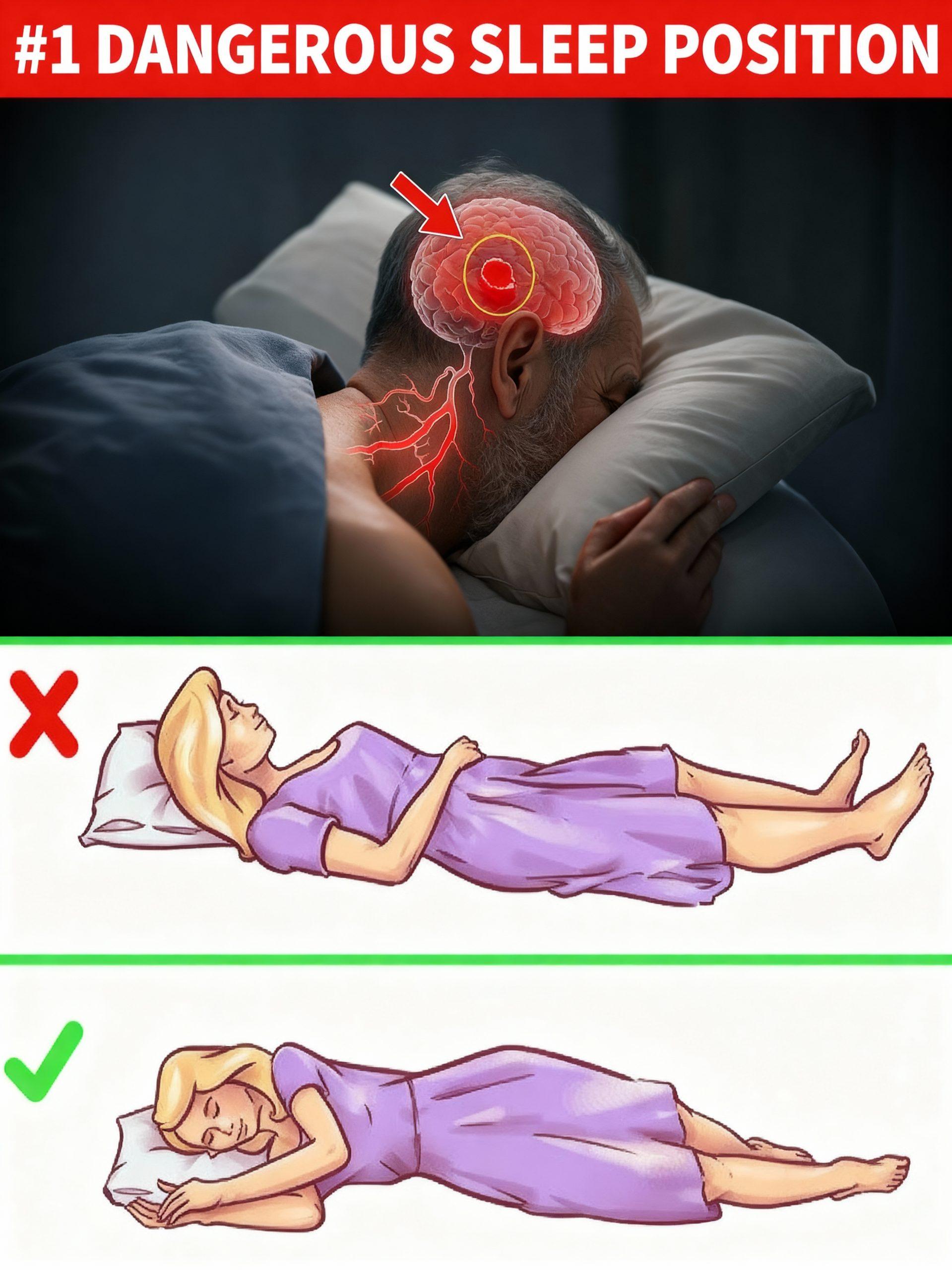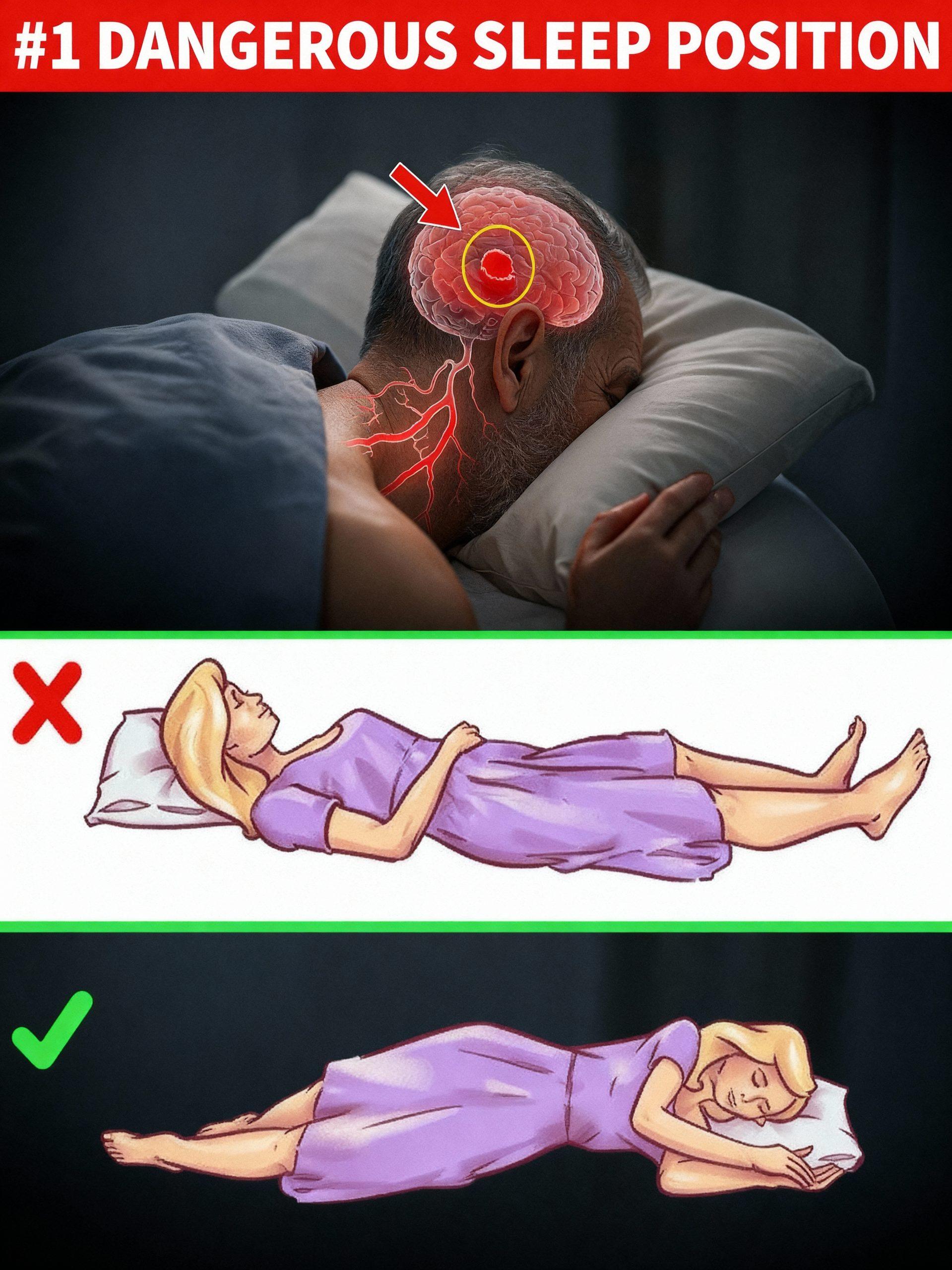Picture this: you drift off to sleep, nestled in your favorite position, unaware that the way you rest could be silently shaping your health. Could something as simple as how you lie in bed influence your risk of a stroke? The idea might sound far-fetched, but emerging science suggests your sleep posture plays a bigger role than you think—especially for adults over 45. From blood flow to your brain to the strain on your heart, your nightly habits could be a hidden factor in your long-term wellness. The good news? Small, intentional changes to how you sleep can unlock better circulation, deeper rest, and even a lower stroke risk. Ready to rethink your bedtime routine? Let’s dive into why your sleep position matters and how to make it work for your health.

🌙 Why Your Sleep Position Holds the Key to Better Health
Every night, you settle into bed without a second thought about how your body is positioned. But research reveals that your sleep posture can affect critical systems—your brain, heart, and spine—in ways that compound over time. For older adults, who may already face higher risks for cardiovascular issues, these effects are even more significant. Poor sleep positions can:
- Restrict blood flow to your brain, starving it of oxygen.
- Increase strain on your heart and blood vessels.
- Worsen snoring or sleep apnea, limiting oxygen intake.
- Cause chronic neck and back discomfort.
Over years, these subtle stressors may contribute to serious concerns, including stroke risk. But the flip side is empowering: by tweaking your sleep posture, you can support better circulation, reduce inflammation, and wake up feeling sharper. Let’s explore the risks of certain positions and the transformative benefits of smarter sleep habits.
🚫 The Sneaky Dangers of Stomach Sleeping
Stomach sleeping might feel like a cozy escape, but it’s one of the least friendly positions for your body. When you lie face-down, your neck twists unnaturally for hours, compressing key arteries like the carotid that supply blood to your brain. This prolonged strain can reduce oxygen flow, especially if you already have high blood pressure or sleep apnea. Studies suggest that stomach sleeping may slightly elevate stroke risk over time, particularly for those with existing cardiovascular concerns.
Beyond circulation, stomach sleeping flattens your spine’s natural curve, leading to back pain and stiffness. It can also exacerbate snoring, further limiting oxygen to your brain. The silver lining? Shifting to a healthier position is easier than you think—and the rewards are immediate.
✅ 10 Game-Changing Benefits of Optimizing Your Sleep Position
Switching to a brain- and heart-friendly sleep posture can transform how you feel, both at night and during the day. Here are 10 compelling reasons to rethink your bedtime alignment.
🧠 1. Enhanced Brain Blood Flow
Side sleeping aligns your neck naturally, allowing blood to flow freely to your brain. Many report fewer morning headaches and sharper mental clarity after making the switch.
🦴 2. Reduced Neck and Spine Stress
Back or side positions maintain your spine’s natural curve, minimizing stiffness and aches. Wake up without that nagging neck pain.
🌬️ 3. Easier Breathing for Better Oxygenation
Side sleeping opens your airways, reducing snoring and sleep apnea episodes. More oxygen means a happier heart and brain.
❤️ 4. Heart-Friendly Rest
Sleeping on your back with a slightly elevated head reduces cardiovascular strain. Some studies suggest this can even help lower blood pressure overnight.
😴 5. Deeper, Restorative Sleep
Comfortable positions mean fewer tosses and turns, helping you stay in deep sleep cycles that repair your body and mind.
🔥 6. Lower Inflammation Levels
Gentle postures reduce physical stress, calming inflammation—a key factor in stroke and heart disease risk.
🕰️ 7. Long-Term Stroke Risk Reduction
Consistent, supportive sleep habits may lower your stroke risk over time by optimizing circulation and reducing vascular strain.
⚡ 8. Boosted Morning Energy
With better rest, you’ll wake up refreshed, with more energy to tackle your day.
😊 9. Improved Mood and Focus
Quality sleep supports emotional balance and mental sharpness, helping you feel more like yourself.
🩺 10. Overall Wellness Boost
From sharper cognition to a stronger heart, the right sleep position sets the foundation for vibrant health as you age.
These benefits aren’t just theoretical—real people notice real changes. Take Sarah, 60, who switched from stomach to side sleeping and reported fewer migraines within weeks. Or Mark, 48, who found back sleeping eased his snoring, leaving him more energized.

🛏️ How to Transition to Healthier Sleep Positions
If you’re a lifelong stomach sleeper, changing your habits might feel daunting. But with a few practical tweaks, you can ease into side or back sleeping comfortably. Here’s how to make the shift without losing sleep.
🤗 Use a Body Pillow for Side Sleeping
Hugging a body pillow keeps you anchored on your side, preventing you from rolling onto your stomach. It also adds a cozy sense of security.
🛌 Choose the Right Pillow
Opt for a medium-firm pillow that’s not too high or too soft. This keeps your neck aligned with your spine, reducing strain.
⏳ Shift Gradually
Start by spending part of the night on your side or back. Over 1–2 weeks, your body will adapt, making the new position feel natural.
📐 Elevate Your Head Slightly
Use a small wedge or folded towel under your pillow to lift your head 10–20 degrees. This improves airflow and reduces heart strain, especially for snorers.
🛠️ Create a Supportive Sleep Setup
Place a pillow under your knees when back sleeping to support your lower spine, or between your knees for side sleeping to align your hips.
These small adjustments add up, making your transition smooth and sustainable. Many find that within days, they’re sleeping better and waking up refreshed.
💡 Pro Tips for Maximizing Sleep Health
Your sleep position is just one piece of the puzzle. To amplify the benefits and further reduce stroke risk, pair your new posture with these healthy habits.
🥗 Support Your Heart with Nutrition
Eat a diet rich in fruits, vegetables, and whole grains to keep your blood vessels flexible and your heart strong.
🏃♀️ Stay Active
Aim for 30 minutes of moderate exercise daily—walking, yoga, or swimming—to boost circulation and reduce stroke risk factors.
💧 Hydrate Well
Drink 8–10 glasses of water daily to support healthy blood flow and prevent dehydration-related strain on your heart.
🩺 Monitor Your Health
Regularly check your blood pressure and cholesterol levels, especially if you’re over 45. Early detection can prevent complications.
😴 Prioritize Sleep Hygiene
Keep a consistent sleep schedule, limit screen time before bed, and create a cool, dark bedroom to enhance sleep quality.
⚠️ Safety First: When to Seek Expert Advice
While adjusting your sleep position is generally safe, it’s not a one-size-fits-all fix. Consult a healthcare provider if you:
- Have chronic neck or back pain that persists despite changes.
- Experience severe snoring or suspected sleep apnea.
- Have a history of heart disease, high blood pressure, or stroke.
- Notice symptoms like dizziness, chest pain, or irregular heartbeats.
A doctor or sleep specialist can recommend personalized strategies, such as a sleep study or tailored pillow support, to optimize your rest.
🌟 Small Changes, Monumental Impact
Your sleep position is more than a habit—it’s a nightly opportunity to nurture your brain, heart, and overall health. By moving away from stomach sleeping and embracing side or back positions, you’re investing in better circulation, deeper rest, and a lower stroke risk. Real stories, like Jane’s newfound morning clarity at 62 or Tom’s reduced headaches at 55, show that these changes deliver results.
💬 Take the First Step Tonight
Why not start tonight? Grab a body pillow, adjust your head elevation, and try side sleeping for just a few hours. Notice how you feel in the morning—lighter, clearer, and ready to thrive. Share your experience in the comments to inspire others on their journey to healthier sleep.
📌 A Quick Note
This article is for informational purposes only and is not a substitute for professional medical advice. Always consult a healthcare provider for guidance tailored to your health needs.
Sleep is your body’s chance to reset and recharge. By choosing a position that supports your brain and heart, you’re not just resting—you’re building a foundation for a longer, healthier life. Here’s to waking up to brighter mornings and a stronger you.
(Word count: 1,423)






